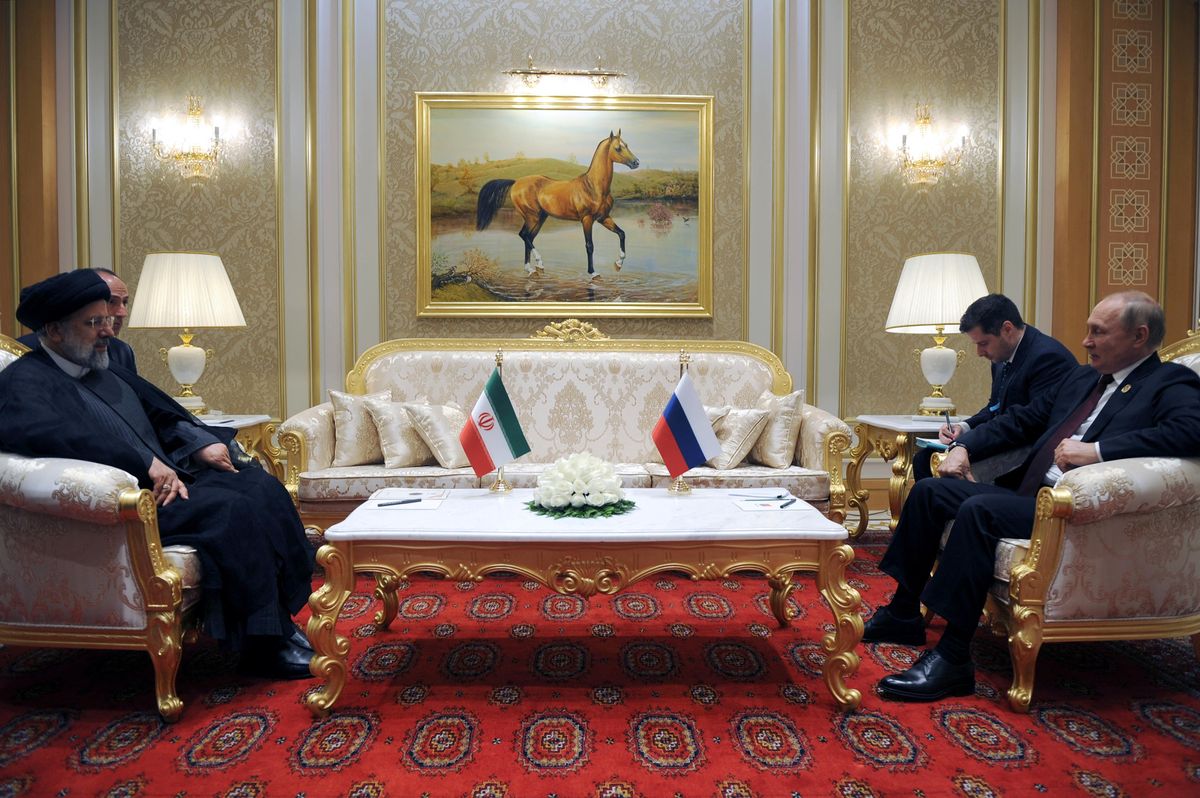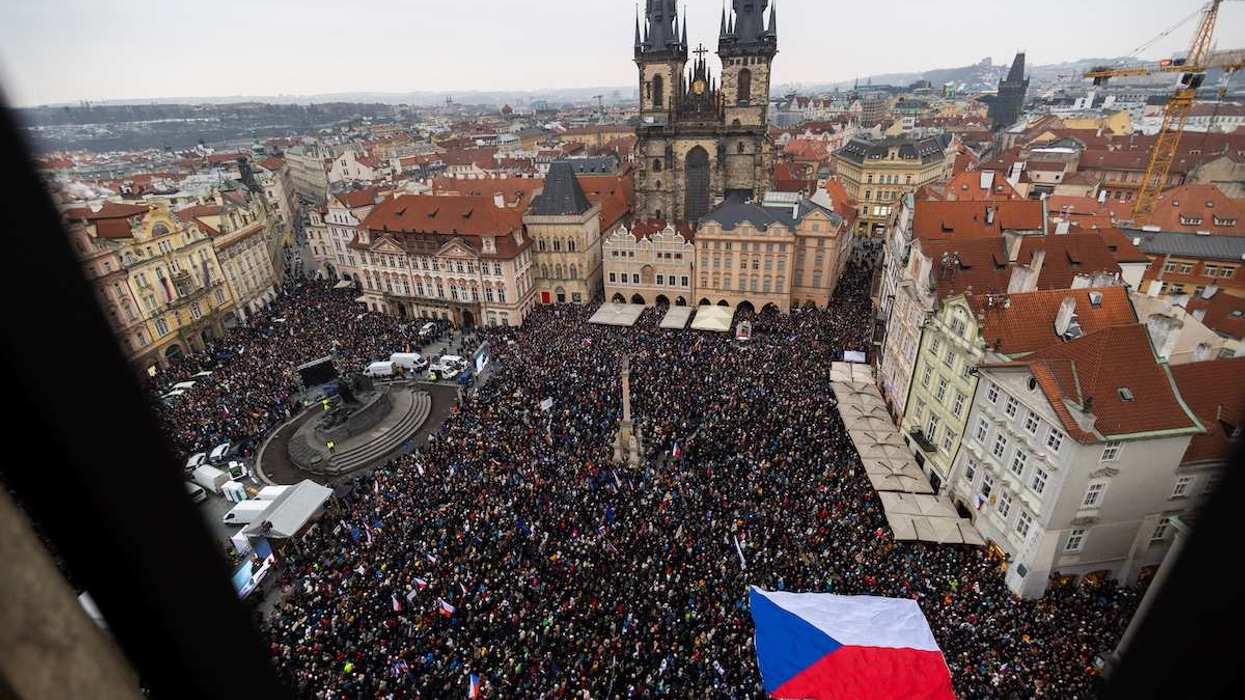Iran and Russia are considered staunch enemies of the West, paying for it with crippling sanctions and diplomatic isolation — in Tehran's case over its nuclear program and in Moscow's over its invasion of Ukraine. The two countries, consequently, have turned to one another and boosted their economic and military cooperation.
But even as the US attempts to back a new, anti-Iran order in the Middle East, Russia is making its own moves there.
On Tuesday, Russian President Vladimir Putin will meet his Iranian counterpart, Ebrahim Raisi, in Tehran. They will be joined by Turkey’s President Recep Tayyip Erdogan, a prickly member of NATO but also the main interlocutor of the ongoing peace negotiations between Moscow and Kyiv, as well as a key player in Syria, where the three countries have converging and conflicting interests.
What's on the agenda? Energy, arms, alliances, and Syria. But above all, the need to unite on a worldview different to the one US President Joe Biden pushed for during his recent regional tour.
Seeking a slick solution. “The proximate reasons for this meeting are pretty obvious. Russia has entered a discount war with Iran for oil markets, and Tehran wants that stopped …,” says Cliff Kupchan, chairman of Eurasia Group.
When it comes to energy talk, some fence-mending is expected. Russian oil producers, stonewalled out of Western markets by sanctions, have been selling cheap oil to China, India, and other Asian buyers, moving aggressively on a coveted client list of “will-work-with-sanctioned-sellers” Iran has carefully cultivated for years while under similar sanctions.
The Iranians are not happy about having to push the price of their oil down further because the Russians are selling at a bargain. After all, oil exports make up half of the Islamic Republic’s export income.
Putin will try to do some hand-holding, even as he seeks expertise from the Islamic Republic about how to work through sanctions, which Tehran has survived for almost two generations.
Weapons, please. Ahead of Putin's trip, Washington claimed Iran wanted to sell Russia weapons-capable drones for use in Ukraine. The Iranians denied the charge; the Russians didn’t comment. But earlier this summer, Russian officials did visit Iran to check out Tehran’s advanced drone program.
In the end, “Russian weapons will go to the Iranians, and Iranian drones to Russia," says Bruce Riedel, a senior fellow at the Brookings Institution.
Keeping Iran close. Russia’s leader has spent time and resources to court the Iranians. Putin’s already met Raisi twice this year, and he recently declared in Turkmenistan that Moscow-Tehran ties are of a “truly deep, strategic character.” Bilateral trade, up 80% to $4 billion in 2021 compared to the year before, is now being targeted to expand ten-fold.
Playing along with Moscow and Beijing in bloc politics, Iran is reciprocating by moving to join the Russia and China-led Shanghai Cooperation Organization, which would make Tehran “one of the key centers of the emerging multipolar world order,” according to Russian Foreign Minister Sergey Lavrov.
Moreover, in exchange for Iran's playbook on how to get through sanctions, Putin is even considering preferential grain deliveries to inflation-hit Iran. “Russia will now be a major hole in sanctions on Iran,” says Riedel.
But there are cracks, too. Russia and Iran have competing interests in the Middle East. Putin has relationships with US allies that Iran either considers outright enemies, like Israel and Saudi Arabia, or is uncomfortable with, such as the UAE and Egypt.
Then there's the aforementioned undercutting of Iran by Russia on energy exports, which the isolated regime in Tehran relies heavily on. What's more, Russia threw a sanctions curveball earlier this year that dashed hopes for a swift revival of the Iranian nuclear deal, shocking Tehran. While Russia taking a massive bite out of Iran’s share of oil consumers angered Tehran, that’s where Putin comes in with diplomacy, shrewdly managing to win over the Iranians strategically while bleeding them commercially.
Putin stealing Tehran’s lunch with recent energy sales isn’t cultivating support on the streets of Iran for Russia either. But ultimately, the basic instinct of both states is revisionism – pushing against the status quo. That’s what binds them. And that’s where the peril and potential of the Russia-Iran axis lie.
“We are all now immersed in the war in Ukraine. But Putin's playbook has much more depth than the war. It's been about — and will again be about — lashing out and playing spoiler against the US-led order,” Kupchan says.
This week, expect Putin to try and solidify ties with a key ally in that broader venture, which Kupchan says the West should watch closely. China may pose many challenges, but it has more vested interests in the status quo, unlike Russia and Iran, which together can become “real trouble.”
What about Turkey? Don’t expect Ankara to be a mere third wheel. While the Turks ticked off Putin by agreeing (in return for security assurances) to not block NATO enlargement to Finland and Sweden, Erdogan has successfully emerged as mediator-in-chief between Russia and Ukraine.
Just last week, he managed to get an in-principle agreement from Russia to lift the blockade of Ukraine’s Black Sea ports and free up some 20 million metric tons of food to feed the region and beyond.
Putin and Erdogan will talk shop about how to get Ukrainian grain through the Black Sea. They will also discuss Turkey’s drone sales to Ukraine, which Putin likely resents because they’ve been highly effective on the battlefield.
Lastly, they’ll tackle the issue of Syria, where finding a consensus among the three countries won’t be easy.
Moscow and Tehran support President Bashar al-Assad, while Turkey backs the rebel groups who are fighting him. Moreover, the Turks also want take out the Kurdish militias based in northern Syria — but Ankara will need Russian and Iranian sign-offs because the two countries remain influential in the war-torn country.
Upshot. Biden says America will push back on efforts by China, Russia, and Iran to fill the vacuum created by US disengagement from the Middle East. But it’s not going to be that simple.
The Iran nuclear deal is still not back on track. If Iranian drones end up getting deployed in Ukraine, and Russian weapons end up in Tehran’s hands, it'll take more than a Saudi fist bump for America to counter its rivals in the world’s most volatile region.



















